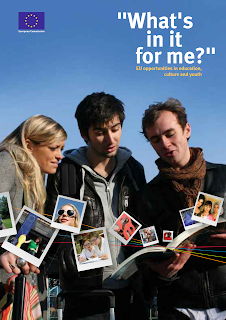Groups of pupils (each group will have 2-3 pupils) informed citizens of all ages about the rights that they have got in the European Union. They distributed EUBookshop’s publications and leaflets (Europe and you - A snapshot of EU achievements, Move in Europe - Enhancing young people's education, mobility and access to the job market, Do you know what social Europe can do for you?, Freedom to move and live in Europe - A guide to your rights as an EU citizen, Your social Europe - An overview of useful information sources, "What's in it for me?" - EU opportunities in education, culture and youth, Your guide to the Lisbon Treaty) about what Europe has done for them and about their rights as European citizens. The pupils acted like mini reporters and tried to ask questions to the citizens in order to take the pulse of the local society about European topics (they had prepared a special questionnaire for this action).
A snapshot of EU achievements
Have you ever wondered exactly what it is that the European Union does for you? If so, this booklet provides the answer with a brief glimpse at a few of the tangible steps the EU has taken in 2010 to make life better and easier. Sometimes it is in finding simple everyday solutions, such as persuading mobile phone makers to switch to a standard form of charger. Sometimes it is European laws that give citizens new rights. Sometimes it is battling against continental and global forces to maintain the EU’s economic equilibrium and generate jobs. And sometimes it is in helping to restore hope to people suffering natural or man-made disasters, in Europe and beyond. But in every case, the EU is acting to create a Europe in line with the responsibility taken on by its founders to work in the interests of ‘the peoples of Europe’. Everything we do is for the citizens of Europe. The EU will continue to place people’s concerns on the political agenda.
EU opportunities in education, culture and youth
The European Union supports a wide range of activities in education, training, culture, research and youth. This booklet provides brief information on some of the programmes that the Directorate-General for Education and Culture runs. To make it easier to consult, it does not always use the formal EU terminology, and does not include all EU programmes, instruments and actions. But in each section it does say where to go for more information. And it lists the national agencies and other important organisations that are the gateways to taking part in the activities.There may be something in it for you.
After decades of war that cost millions of lives, the foundation of the EU marked the beginning of a new era where European countries solve their problems by talking, not fi ghting. Today, members of the EU enjoy a wealth of benefi ts. The existing rules, however, were designed for a much smaller EU, and an EU that did not have to face global challenges such as climate change, a global recession or international cross-border crime. The EU has the potential, and the commitment, to tackle these problems, but can only do so by improving the way it works. This is the purpose of the Lisbon Treaty. It makes the EU more democratic, effi cient and transparent. It gives citizens and parliaments a bigger input into what goes on at a European level, and gives Europe a clearer, stronger voice in the world, all the while protecting national interests. This leafl et explains what the Lisbon Treaty means to you as a citizen.








